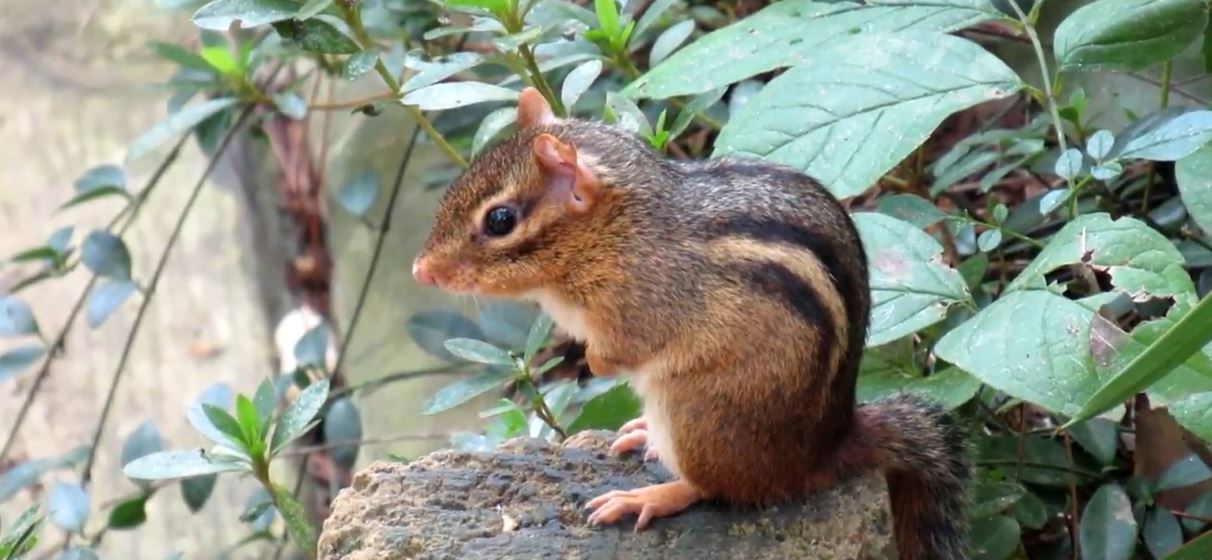How To Get Rid Of Chipmunks

If you have an infestation problem with chipmunks, you have already discovered that they aren't just cute; they can also be a nuisance. It's one thing to go the park and have a cute little chipmunk scamper up and eat peanuts out of your hand. It's quite another to have them nesting under your porch, eating your pet's food, or chasing away the birds from your feeder and eating all the birdseed themselves.
To be completely fair, chipmunks aren't all bad. They are actually omnivorous and will eat decaying meat, bugs, grubs, seeds, and many other things. So a couple of them could be helpful to have around. But if you are overrun with them, here are a few tips on how to get rid of them
Habitat Modification
To begin with, get rid of any piles of lumber, rocks, debris, or anything else that might provide a warm, safe haven for the chipmunks. Keep your yard mowed short, bushes trimmed and dispose of the trimmings appropriately.
Keep pet food inside. Use bird feeders that are “squirrel-proof,” and keep the extra birdseed in closed containers and stored properly. If you have garden or field seed stored, place it in tight containers. Do the same with chicken, cow, horse, or other animal feed.
Chipmunks like bird eggs and hatchlings, too. So if you have birdhouses, make them chipmunk-proof, or as inaccessible as possible. The same is true with baby chicks.
Sheds And Outbuildings
Do all you can to close up the foundations of your sheds and outbuildings, porches, and other places where chipmunks can get underneath shelter and set up housekeeping. They can undermine your foundations and piers with their burrowing, causing all manner of problems for you.
Quarter-inch hardware cloth will keep chipmunks from burrowing under porches or other places. Staple the cloth to the edge boards where you want to exclude the chipmunks, and then bury the cloth up to eight inches deep to keep them out.
Repellents
There are various repellents available that are supposed to be effective in deterring chipmunks from bothering your plants or bird feeder. However, if you use the same one all the time, they will adapt to it and begin to ignore it after awhile. If you're going to use repellents, at least mix them up, using different ones regularly. Repellents are not the most effective method, though, for chasing away the little guys.
Traps
Trapping may be the most effective way to rid your property of chipmunks. You can choose between lethal traps and non-lethal traps. A rat trap will work for chipmunks, too, as they aren't much different in size. Killing the little cuties is rather extreme, however, considering all the good they do, too. So you should opt for live traps instead. Besides that, if you use the killing traps, think of the mess you'll have to clean up and dispose of.
A live trap is just a wire cage with a trap door that springs shut when the chipmunk enters the trap and eats the bait. You can use sunflower seeds mixed into peanut butter for bait. The peanut butter will stick to the trigger until the chipmunk eats it.
Consider not setting the trigger on the trap for two or three days, allowing the chipmunks to get used to it being there and being a source of goodies. After you see them going in regularly to feed, then you can set the trigger that will shut the trap door the next time one goes in to eat.
Be sure to check the traps frequently—at least once a day, if not two or three times a day. When you have captured one (or more), you can take the trap somewhere to relocate the chipmunks. Be sure that it's okay to let them go at the place you have chosen. Place a sheet or towel over the trap so the chipmunk won't be traumatized when you approach the trap and then transport it to the new location.
Fumigants And Poisons
There are no fumigants or poisons specifically for chipmunks, but ones made for other rodents may work. Before buying any, check with your local wildlife agency to make certain that it's legal to use the type of fumigant or poison that you have chosen. In some states, it's illegal to poison a chipmunk.
Even if it's legal where you live, consider the effects of secondary poisoning. You poison a chipmunk (or several) and then a bird on the endangered species list comes along and eats your poisoned chipmunk and then dies. Now you have a problem on your hands. Furthermore, your pets or other animals could get into the poison you meant for the chipmunks and they will get sick and die. Because of this, poisons are best left alone.
Read the Pest Wildlife Home Page page for helpful information and to learn more about How To Get Rid Of Chipmunks

